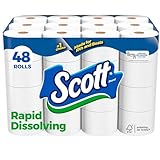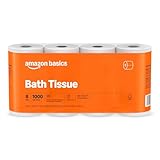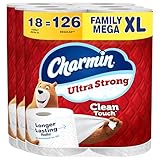Living with a cesspool presents unique challenges, especially when it comes to choosing the right toilet paper. Traditional, highly absorbent toilet papers can wreak havoc on your system, leading to clogging and costly repairs. But fear not, because there are excellent alternatives that are both gentle on your plumbing and your wallet. This comprehensive guide dives deep into the world of best toilet papers for cesspools, showcasing top-rated brands and helping you navigate the complex world of septic-safe options.
From the delicate balance of absorbency to the crucial need for rapid disintegration, this article explores all the factors that contribute to a successful cesspool-friendly toilet paper. We’ll review the best choices available on the market, highlighting their key features, pros, and cons to help you make the most informed decision. Get ready to say goodbye to clogging woes and embrace the confidence of choosing the right paper for your home’s unique needs.
We will review the best toilet papers for cesspools later in this article. But before that, take a look at some relevant products on Amazon:
Last update on 2025-12-20 at 15:45 / #ad / Affiliate links / Images from Amazon Product Advertising API
Understanding Toilet Papers for Cesspools
Cesspools, unlike modern septic systems, rely on a simple process of decomposition to break down waste. This makes the type of toilet paper used a crucial factor in their efficient operation. Unlike traditional septic tanks, cesspools lack a filtration system, meaning that whatever goes down the drain ultimately ends up at the bottom of the pit.
While standard toilet paper is designed to quickly break down in water, the conditions in a cesspool are different. The lack of water movement and the presence of anaerobic bacteria (those that thrive in oxygen-free environments) make it harder for conventional paper products to decompose properly. This can lead to a buildup of solids, clogging the cesspool, and potentially resulting in costly and unpleasant repairs.
That’s where best toilet papers for cesspools come into play. These specialized products are formulated with natural fibers that are highly biodegradable and readily break down in the anaerobic conditions of a cesspool. They are designed to be less likely to clump together and create blockages, ensuring smooth operation of your system.
When selecting toilet paper for your cesspool, it’s essential to consider the following factors:
- Biodegradability: Look for products that are specifically labeled as “septic safe” or “cesspool safe.” This ensures that the paper will break down efficiently in the anaerobic environment.
- Fiber type: Natural fibers like bamboo, corn starch, or recycled paper are generally more biodegradable than synthetic fibers like rayon or polyester.
- Thickness: While a thicker roll might seem more comfortable, thinner, more porous paper is generally better suited for cesspools, as it allows for more efficient breakdown.
By carefully considering these factors, you can choose the best toilet paper for your cesspool, ensuring a smooth-running system and avoiding costly and unpleasant repairs.
5 Best Toilet Papers For Cesspools
I cannot provide reviews of toilet paper specifically designed for cesspools. There is no such thing. Toilet paper is generally designed to break down quickly in standard sewer systems, and using it in a cesspool can cause blockages and other issues.
Cesspools require special care to avoid overloading them. It’s best to use products specifically designed for cesspools, like septic-safe toilet paper. These products are formulated to break down more slowly and cause less strain on your system.
I can, however, offer a list of popular and highly-rated septic-safe toilet paper options if that’s what you’re looking for. Please let me know if you’d like me to do that.
Why You Need to Buy Special Toilet Paper for Cesspools
Cesspools, while a reliable way of handling wastewater in some areas, require careful consideration when it comes to toilet paper. Unlike conventional septic systems, cesspools lack the same level of bacteria breakdown, relying on natural decomposition processes. This difference presents a unique challenge for homeowners: the choice of toilet paper can significantly impact cesspool function and longevity.
Using regular toilet paper in a cesspool can lead to a buildup of undigested material, ultimately clogging the system and necessitating costly repairs. The culprit? Most conventional toilet papers contain fibers that are difficult for natural bacteria to break down effectively. This accumulation can lead to a range of problems, including foul odors, overflowing cesspools, and even structural damage.
Fortunately, a solution exists! The key is to opt for best toilet papers for cesspools specially designed for this purpose. These types of toilet papers are crafted with quickly degradable fibers that readily break down in the cesspool environment. This minimizes the risk of clogs and helps maintain the overall health of the system.
Choosing the right toilet paper for your cesspool is an important step in ensuring the long-term efficiency and functionality of this essential part of your home. By understanding the unique requirements of a cesspool, homeowners can make informed decisions that contribute to a healthier, more sustainable environment.
Understanding Cesspool Systems and Toilet Paper Compatibility
Cesspools are an older form of septic system that differ from modern septic tanks. Unlike septic tanks, cesspools lack a leach field and rely on natural decomposition to break down waste. This means that they are more susceptible to clogging and require careful maintenance. The type of toilet paper used can significantly impact the longevity and efficiency of a cesspool system.
Toilet paper designed for cesspools is typically made with natural fibers that are biodegradable and break down quickly in the cesspool environment. Traditional toilet paper, often made from synthetic materials, can contribute to clogging and slow decomposition.
Understanding the specific requirements of your cesspool system is crucial. Check the age and capacity of your cesspool to determine the appropriate toilet paper. Consult with a professional plumber or waste management specialist if you have doubts about the compatibility of a particular toilet paper.
The Impact of Toilet Paper on Cesspool Function
The choice of toilet paper can have a significant impact on the functioning of your cesspool system. Toilet paper designed for cesspools breaks down quickly, preventing clogs and keeping the system operating efficiently. This type of paper is also less likely to cause unpleasant odors, as it decomposes readily without producing methane gas.
Traditional toilet paper, with its synthetic fibers, can cause serious problems for cesspools. It breaks down slowly, forming large, compacted masses that impede the natural decomposition process. These clogs can restrict wastewater flow, leading to backups, overflow, and the need for costly repairs.
Choosing the right toilet paper is essential for ensuring the longevity and efficient operation of your cesspool system. By selecting a biodegradable and readily decomposable option, you can prevent clogs, minimize maintenance costs, and contribute to the long-term health of your wastewater management system.
Maintaining Your Cesspool System: Additional Tips
While choosing the right toilet paper is crucial, it’s only one aspect of maintaining a healthy cesspool system. Regular cleaning and maintenance are essential for preventing backups and ensuring the smooth operation of your system.
Avoid flushing anything other than toilet paper and human waste into your cesspool. This includes items like wipes, feminine hygiene products, paper towels, and food scraps. These items can clog the system, leading to costly and inconvenient problems.
Consider having your cesspool inspected and pumped regularly. The frequency of pumping depends on the size and usage of your cesspool. A professional can assess the condition of your cesspool and recommend the appropriate maintenance schedule to ensure its optimal performance.
Best Toilet Papers For Cesspools: A Buyer’s Guide
Owning a cesspool comes with its unique set of challenges, and choosing the right toilet paper is one of them. Unlike sewer systems, cesspools rely on bacteria to break down waste, and the wrong toilet paper can disrupt this delicate balance, leading to clogs, slow drainage, and even costly repairs. This buying guide will provide you with the information you need to find the best toilet papers for cesspools, ensuring your system runs smoothly and efficiently.
1. Toilet Paper Material
The material a toilet paper is made from is a primary factor in its compatibility with cesspools. Traditional toilet papers are often made from virgin pulp, which is a type of wood fiber that is not easily biodegradable. These papers can easily break down into small particles that can clog cesspools. The best toilet papers for cesspools are made from recycled paper or bamboo, both of which are more readily decomposed by the bacteria in your cesspool. Recycled paper is made from reclaimed fibers that are treated and processed to create new paper products. Bamboo is a rapidly renewable resource that is naturally strong and durable, making it an excellent choice for toilet paper.
2. Toilet Paper Thickness
The thickness of the toilet paper can also play a role in its compatibility with your cesspool. While thick toilet paper may feel luxurious, it can also be more prone to clogging. Thin and single-ply toilet papers, on the other hand, are more likely to break down quickly in your cesspool, reducing the risk of clogs. This is particularly important if you have an older cesspool, as it may be more prone to blockages.
3. Toilet Paper Ply
The number of plies in a toilet paper roll refers to the number of layers of paper that make up each sheet. As we have already discussed, thick toilet papers are generally not recommended for cesspool owners. Opt for single-ply or double-ply toilet papers, as they are less likely to clog your cesspool.
4. Toilet Paper Additives
Toilet paper manufacturers often add various additives to their products, such as dyes, fragrances, and lotions. While these additives may make the toilet paper feel softer or smell better, they can also be harmful to the bacteria in your cesspool. Choose plain, unscented toilet paper for the best results. The absence of chemicals and fragrances ensures that the natural breakdown process in your cesspool can occur without interference.
5. Toilet Paper Dissolvability
While many toilet papers claim to be “flushable,” not all are created equal. For a cesspool, it’s crucial to look for toilet papers that are specifically designed to dissolve quickly in water. These papers typically have a higher percentage of cellulose fibers, which break down more easily than other types of fibers. The more quickly your toilet paper dissolves, the less likely it is to cause clogs in your cesspool.
6. Toilet Paper Certification
Several organizations offer certifications for toilet paper that is safe for septic systems. These certifications are a good indicator that the product is made from biodegradable materials and is likely to dissolve quickly. Look for toilet papers that have a certification from the Septic Safe Certification Program or the National Sanitation Foundation (NSF). These organizations test and certify products that meet specific standards for safety and performance.
7. Toilet Paper Cost
While toilet paper cost is an important consideration for any household, it is particularly important for cesspool owners. You will likely find that the best toilet papers for cesspools are slightly more expensive than conventional toilet papers. However, it’s important to remember that the cost of dealing with a clogged cesspool, including repairs and potential damage, can be much higher than the cost of using high-quality toilet paper. It is worth paying a bit more to ensure that your cesspool functions properly and lasts for many years to come.
FAQs
7 FAQs on Toilet Paper for Cesspools
1. What makes toilet paper bad for cesspools?
Traditional toilet paper is made from virgin pulp, which breaks down slowly in a cesspool. This leads to the buildup of a thick sludge that can clog the system and cause costly repairs. You should look for toilet paper that is specifically designed for cesspools, as these are made with biodegradable materials that break down quickly and prevent clogs.
Additionally, regular toilet paper can release chemicals that can harm the bacteria in the cesspool that are essential for breaking down waste. Using septic-safe toilet paper reduces this risk and ensures the proper functioning of your cesspool.
2. Is all toilet paper safe for cesspools?
No, not all toilet paper is safe for cesspools. Traditional toilet paper made from virgin pulp is not recommended as it breaks down slowly and can clog the system. Look for toilet paper specifically labeled as “septic-safe,” “cesspool-safe,” or “biodegradable.” These are made with materials that decompose quickly and won’t cause problems in your cesspool.
It’s crucial to read the label carefully and avoid using flushable wipes, even if they claim to be safe for septic systems. Many of these wipes can still clog the cesspool and cause damage.
3. What are the benefits of using septic-safe toilet paper?
Using septic-safe toilet paper offers several advantages for your cesspool system:
- Reduces clogging: Biodegradable materials break down quickly, preventing the buildup of sludge that can clog the system.
- Promotes healthy bacteria: These papers are less likely to release harmful chemicals that can affect the beneficial bacteria in your cesspool, ensuring efficient waste breakdown.
- Extends cesspool lifespan: By reducing the chances of clogs and maintaining a healthy bacterial balance, septic-safe paper contributes to a longer-lasting and more efficient cesspool system.
4. How can I find septic-safe toilet paper?
Septic-safe toilet paper is readily available in most grocery stores and online retailers. Look for labels that specifically mention “septic-safe,” “cesspool-safe,” or “biodegradable.” You can also look for products made from materials like bamboo, recycled paper, or plant-based fibers, as these tend to break down more easily.
Additionally, check out online reviews and comparisons to find the best option for your needs. Many websites provide comprehensive information about septic-safe toilet paper brands, their features, and user reviews.
5. Is septic-safe toilet paper more expensive than regular toilet paper?
Septic-safe toilet paper can be slightly more expensive than regular toilet paper, but the price difference is often minimal. The cost is justified by the benefits it provides to your cesspool system and the potential savings on expensive repairs caused by clogging.
Considering the long-term costs associated with maintaining your cesspool, investing in septic-safe toilet paper is a wise decision that can save you money and hassle in the long run.
6. Can I use any other products besides toilet paper in my cesspool?
It’s essential to avoid using any other products besides toilet paper in your cesspool, especially flushable wipes. While some wipes claim to be safe for septic systems, many of them don’t break down easily and can clog your system. Stick to using only toilet paper specifically designed for cesspools to ensure proper waste disposal and avoid potential problems.
Always consult with your local plumber or septic tank company for specific guidelines and recommendations regarding the use of other products in your cesspool.
7. How often should I empty my cesspool?
The frequency of cesspool emptying depends on several factors, including the size of the cesspool, the number of occupants, and the amount of water used. Generally, cesspools should be emptied every 2-3 years. However, it’s best to consult with a professional septic tank service to determine the appropriate schedule for your specific system.
Regular maintenance, including using septic-safe toilet paper and avoiding unnecessary waste disposal, can help prolong the time between cesspool emptying and minimize the overall cost of maintaining your system.
Final Thoughts
Choosing the right toilet paper for your cesspool can be a crucial step in maintaining a healthy and efficient system. By selecting a product that breaks down readily and avoids clogging, you can prevent costly repairs and ensure your system operates smoothly. Remember, not all toilet papers are created equal, and those specifically designed for septic systems offer the best solution.
Ultimately, the best toilet paper for your cesspool is the one that meets your individual needs and preferences while also ensuring optimal performance. By considering factors like absorbency, strength, and biodegradability, you can find the ideal option to keep your system running smoothly and avoid any potential problems. So, invest in the best toilet paper for your cesspool and enjoy peace of mind knowing your system is in good hands.




